Barriers to Ensuring Women’s Land Rights and the Way Forward
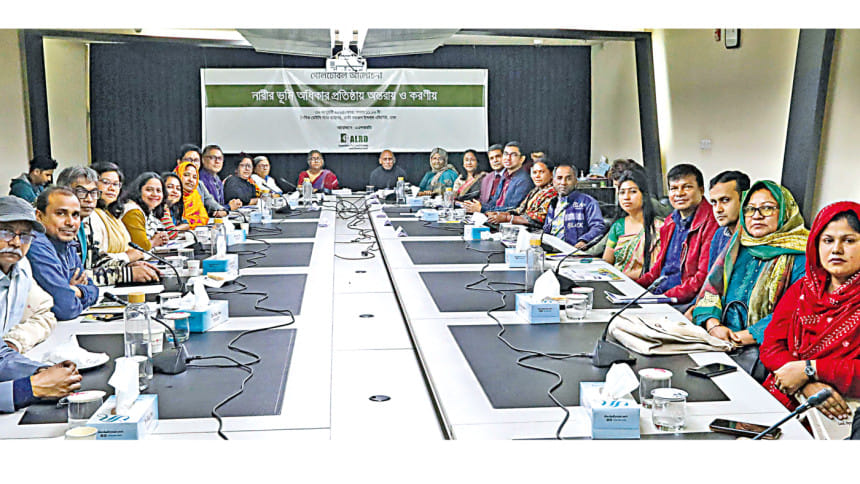
The Association for Land Reform and Development (ALRD), in collaboration with The Daily Star, organised a roundtable titled "Barriers to Ensuring Women's Land Rights and the Way Forward" on January 30, 2025. Below is a summary of the discussion.
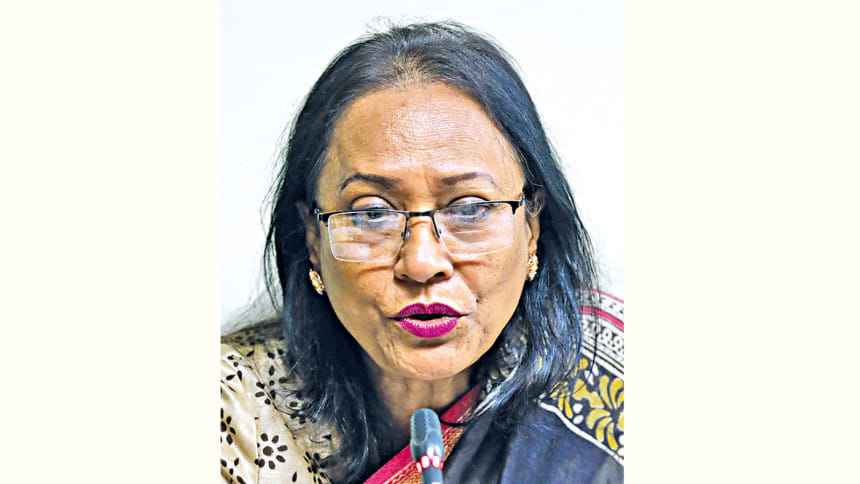
Rowshan Jahan Moni, Deputy Executive Director, ALRD
Today's event is part of ALRD's ongoing advocacy for women's land rights. Over nearly four decades, ALRD has achieved significant milestones, though policy advocacy has faced challenges over the past 15 years. Despite these difficulties, the current landscape presents a unique opportunity.
The Women's Reform Commission has demonstrated a strong commitment, as evidenced by a recent meeting where CSOs, including ALRD, submitted written recommendations. Immediate action could accelerate progress, and ALRD aims to leverage this momentum by organising follow-up meetings with the commission and relevant ministries, engaging key women activists.
ALRD's advocacy aligns with global initiatives such as CEDAW and the Generation Equality movement, particularly the Women's Economic Empowerment Action Coalition. In Bangladesh and across Asia, we are committed to land-based empowerment through the "Stand for Her Land" campaign, led by Khushi Apa, working in tandem with frameworks like Beijing+30.
While inheritance rights remain a crucial issue, women's access to public land is a broader concern, with over 60% of the population landless. Bangladesh's vast khas land remains ineffectively distributed, and initiatives like the Mujib Borsho housing program have sometimes exacerbated existing challenges.
We call for a review of the CEDAW framework to ensure alignment with the priorities. Additionally, we urge the government to draft a new policy addressing land rights, incorporating recommendations from CEDAW.
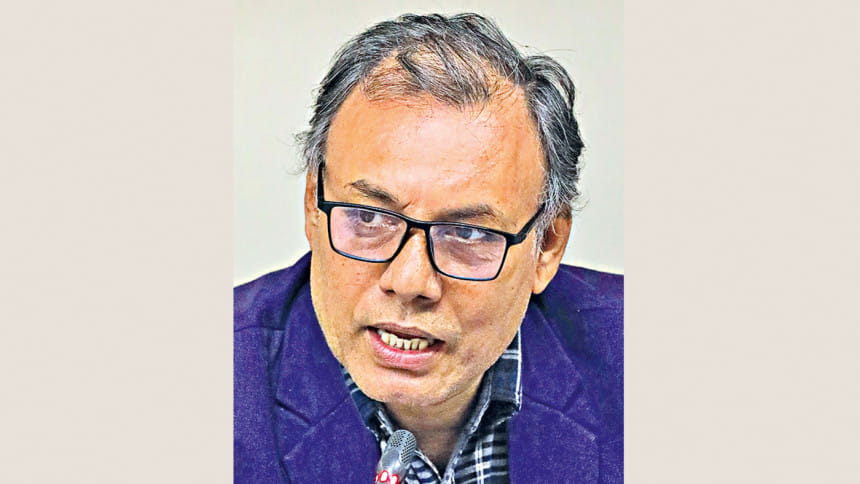
Rafiqul Islam, Program Officer(Adovocay), ALRD
One of the most significant barriers to gender equality in Bangladesh is women's lack of land ownership, which hinders their economic empowerment. Despite constitutional guarantees (Articles 27 and 28), religion-based inheritance laws and discriminatory land policies deprive women of equal rights. Poor and marginalised women also struggle to access agricultural khas land due to restrictive policies that favour male-headed households.
While the government's agricultural khas land distribution was a positive initiative, it has been informally suspended since 2014. Influential individuals continue to occupy khas land, and the Ashrayan Project, while providing housing for the homeless, does not serve as a substitute for agricultural land for marginalised rural workers.
ALRD has submitted two key recommendations to the Women's Reform Commission. First, ensure women's inheritance rights, as religious and customary laws frequently exclude or discriminate against them. Enacting legislation to guarantee equal inheritance rights for women across all religions and ethnic groups is essential. Second, resume agricultural khas land distribution and eliminate discriminatory policies. A 2019 World Bank report indicates that only 13% of agricultural land-owning households have land solely or jointly owned by women. The 1997 Khas Land Management Policy must be revised to remove provisions that prioritise widowed and women abandoned by husband having abled bodied son for applying for the khas land. .
While women's participation in agriculture is increasing, with 58% of agricultural workers being women and 74% of all working women engaged in the sector (BBS Survey 2022), their contributions remain unrecognised. Policies such as the National Agriculture Policy 2018 and the National Women Development Policy (NWDP) 2011 classify women as agricultural labourers rather than farmers. Institutional neglect and patriarchal control limit women's access to government services and agricultural loans. Women's contributions must be formally acknowledged, and their access to markets and marketing support for their produce guaranteed.
Similarly, women in fisheries must be recognised as fisherwomen, included in updated official lists, and provided with fishers' cards. A cooperative system should facilitate their leasing of Jalmahal—government-owned wetlands. In coastal and haor areas, women actively participate in fishing but lack formal recognition, and many suffer from health issues due to poor working conditions. Without official recognition, fisherwomen are excluded from social safety nets. The Jalmahal Management Policy must be reformed to ensure equitable leasing access for those dependent on fishing for their livelihoods.
Wage discrimination is another critical issue. Women in agriculture earn significantly less than men, with male farmers earning BDT 400-500 per day compared to women's BDT 250-300. Additionally, 45.7% of female agricultural workers remain unpaid, while others receive below-market wages. Government intervention is necessary to ensure equal pay.
Women's land ownership, usage, and control must be incorporated into the NWDP (2011). While the policy emphasises women's empowerment, it overlooks land rights, which should be addressed in a dedicated chapter. Additionally, reservations on Articles 2 and 16.1(C) of the CEDAW Charter should be withdrawn to ensure full legal, institutional, and societal equality for women.
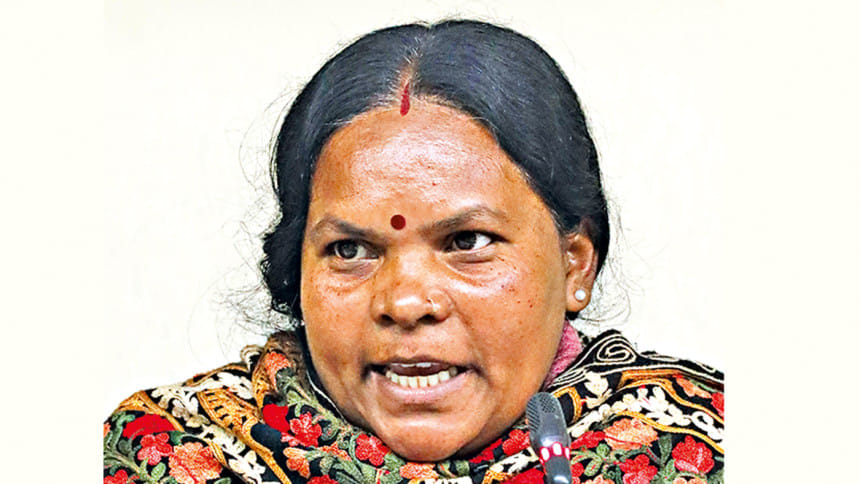
Sabina Hembrom, Paralegal Assistant & President, Landless Group, Chahelgazi, Dinajpur
In our efforts to facilitate the distribution of government-owned khas land, we prioritise widowed and landess women. While assisting landless women in securing landless certificates, we have ensured that these are issued in their names. So far, 23 certificates have been granted, and we continue working to secure women's land ownership.
In agriculture, we have established an organisation of 30 female farmers, enabling us to access seeds, fertilisers, and irrigation equipment from the Upazila. However, 23 families who submitted documents to the union land office have faced setbacks, as the office has indefinitely suspended its operations. As paralegals, we help indigenous community members access these opportunities, as awareness about their rights remains low.
Previously, we were unaware that individuals with even 10 decimals of land are still classified as landless; we had assumed that owning 2 decimals for housing was sufficient. This realisation means our entire indigenous community qualifies as landless. Acknowledging this, we obtained landless certificates and submitted them to the union land office. However, despite repeated visits, progress has stalled due to the office's inactivity, which must be resumed immediately.
Housing alone is not enough—ensuring access to agricultural khas land is crucial for sustainable livelihoods. Authorities claim that land allotments are on hold, yet influential individuals continue to exploit these lands.
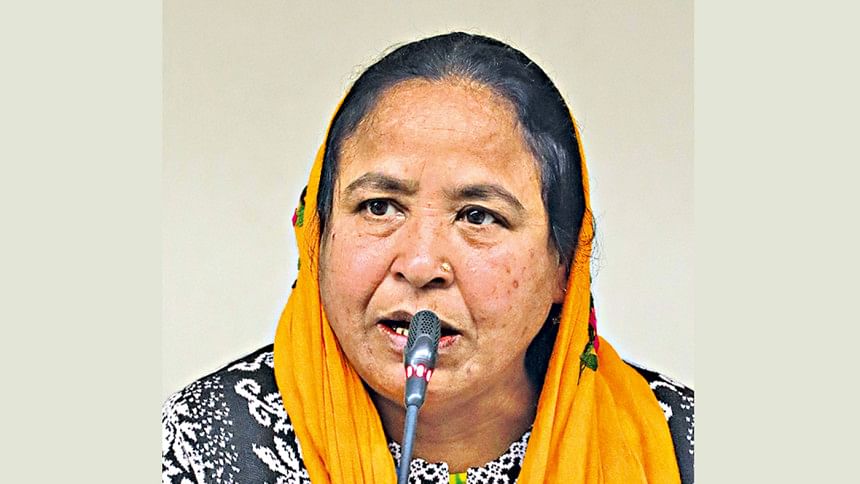
Most. Momtaz Begum, General Secretary, Karnaphuli Nari Cooperative, Mymensingh
As female farmers, we cultivate our own produce, yet at the market, we are forced to sell at lower prices than male farmers. Despite our labour, wholesale traders reap the profits. Immediate action is needed to ensure fair pricing for female farmers. Establishing a dedicated women's market within every wet market would help address this inequality. Government buildings and khas land could be repurposed to create such spaces, expanding opportunities for women in agriculture.
I want to highlight the challenges in obtaining government seeds. A Field Agriculture Officer offered me watermelon seeds and BDT 1,000, as cauliflower seeds were out of stock. Since my 30-member team couldn't grow watermelon, she suggested alternatives. After negotiation, she agreed to provide cauliflower seeds, but a political leader intervened and cancelled the order. These leaders often take exhibition seeds for personal use. I filed a complaint, but the officer claimed helplessness. Exhibition seeds must be reserved for real farmers.
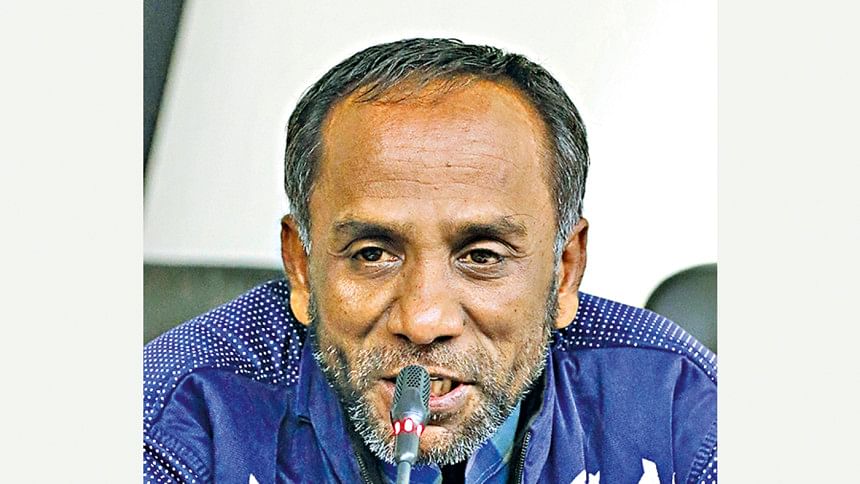
Md. Syful Islam, Animator, SpeedTrust
I have been actively working with the people of the char areas in Patuakhali's Bauphal Upazila, where 15 chars remain isolated by rivers, with no direct access to the mainland. As a result, government officers rarely visit, and residents are unable to travel to the Upazila, depriving them of essential services.
These chars contain 4,000 acres of official khas land and an additional 20,000 acres along a canal. Despite 5,000 landless individuals residing here, influential political figures have seized much of this land. A Prothom Alo report from December 13 last year revealed that 500 acres in Bauphal were reclaimed from illegal occupation.
With ALRD's support, we have organised landless individuals to raise awareness about land rights, engaging multiple times with the government officers. However, they have refused to take action or even officially register landless individuals. The outdated system currently allows only male heads of households to be listed, thereby excluding women. Additionally, 400 houses were allocated through political favouritism, with many recipients not genuinely landless.
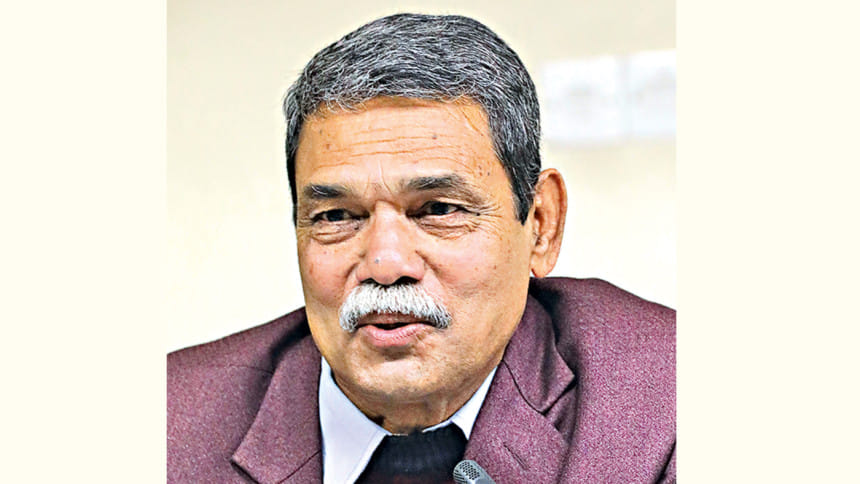
Afzal Hossain, Executive Director, Rural Underprivileged & Landless Farmers Organization (RULFAO), Rajshahi
In regions like Varendra, where urban migration depletes the male workforce, the burden of farming falls largely on village women. Without proper recognition, their opportunities in agriculture will continue to shrink. Beyond acknowledgment, women need access to bank loans to sustain and expand their agricultural activities.
With the mechanisation of agriculture, women must be empowered to operate farming equipment—why should a woman not drive a tractor? Outdated inheritance laws restricting women's land rights must be abolished. NGOs have long championed the causes of khas land distribution and women's land ownership, yet government support remains inadequate.
Societal norms continue to obstruct women's empowerment. Despite often caring for their ageing parents, women are denied their rightful share of land. Wage disparities persist in agriculture, discouraging women from remaining in rural areas. Standardising wages could curb rural-to-urban migration and alleviate pressure on cities.
To build an equitable society, we must strengthen rural agriculture, formally recognise women as farmers, and promote cooperatives. Cultural shifts are essential to foster respect for women in workplaces and communities. In the Varendra region, irrigation operators are frequently appointed through political influence and often demand money for water. Appointing women and indigenous individuals as irrigation operators could introduce greater honesty and efficiency into the system.
In the garment industry, women frequently lose their jobs. By expanding agricultural opportunities and implementing land and agricultural reforms, many displaced women could be reintegrated into rural economies, reinforcing both agriculture and women's roles within it.
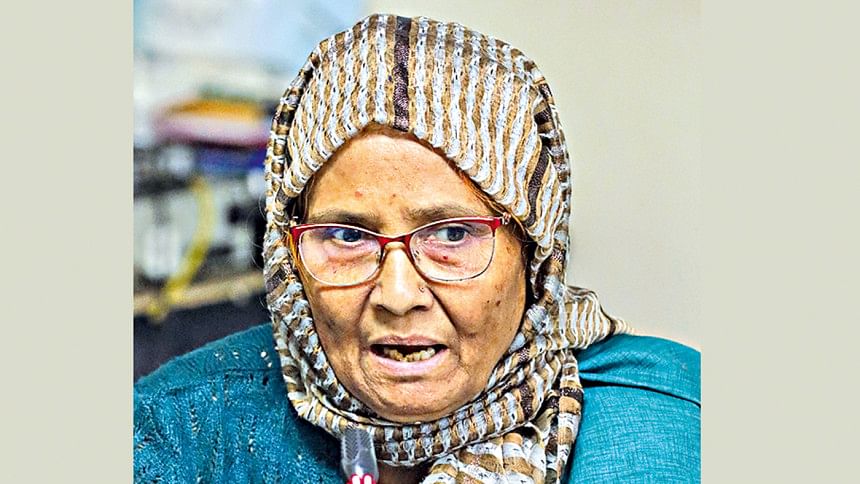
Ferdousi Sultana, Member, Women Affairs Reform Commission & Former Senior Social Development Advisor, Asian Development Bank
While my fellow speakers have addressed the challenges of khas land distribution, I want to highlight the issue of wage discrimination faced by female farmers. Despite the formation of commissions such as the Wage Reform Commission and the Labour Commission, little attention has been given to women in agriculture. Reviewing and revising policies on women's development and empowerment is long overdue.
Additionally, the concerns of Adivasi women regarding forestry, forest regulations, and CEDAW must be prioritised. The persistent belief that a woman must be aided by an able male child continues to undermine women's agency and must be actively challenged.
It is also important to address the longstanding misconception that Adivasi communities were reluctant to participate in crop diversification programmes. While their involvement has increased, it is deeply concerning that officials are now barring them from these initiatives. This exclusion is not only unfair but also unjust.
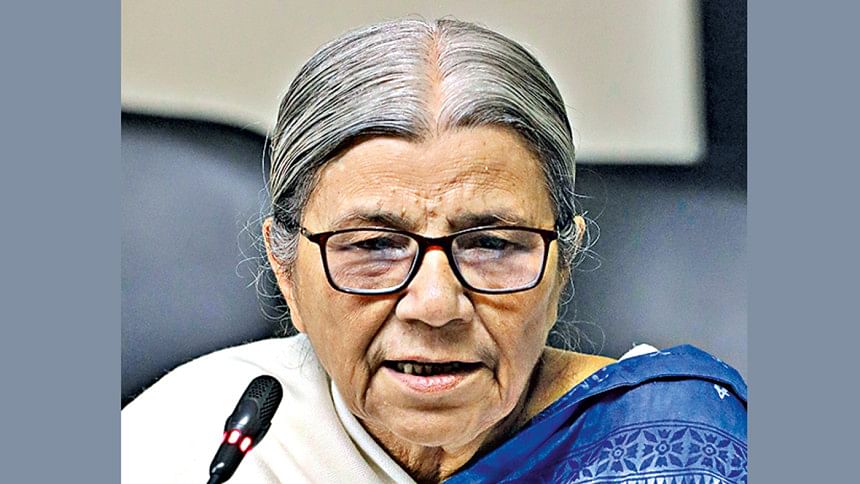
Dr Fauzia Moslem, President, Bangladesh Mahila Parishad (BMP)
Women's land rights remain a pressing issue in our society. Discrimination and hostility towards women continue to manifest in various ways—recent incidents such as the banning of female players from matches and the policing of their lifestyles under the pretext of religiosity exemplify this trend. The Women's Reform Commission must take decisive action to address these challenges comprehensively and effectively.
The Krishak Card must be upheld as a crucial tool for empowering women in agriculture. Additionally, a Uniform Family Code guaranteeing equal inheritance rights for women is essential, particularly given the disparities between the plains and hill Adivasi communities. Updating this code is imperative to ensuring fairness and equality.
The relationship between climate change and land rights is often overlooked and must be integrated into policy discussions. Understanding the ratio of landless men to women is also critical for developing targeted solutions to land-related inequalities.
I want to emphasise two key points: First, we should establish centres similar to the Narikendra in Mymensingh, which have played a crucial role in countering the widespread anti-women sentiments in society. Second, we must urgently address the intersection of female farmers with Jalmahal (waterbodies) and forestry to ensure their equitable access to resources and rights.
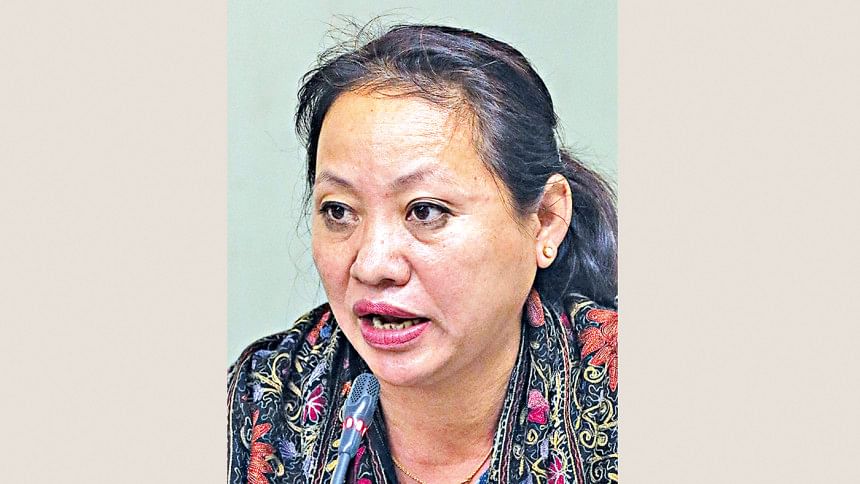
Paramita Chakma, Programme Officer, Bolipara Nari Kallyan Samiti (BNKS), Bandarban
There are 13 Adivasi communities in the Chittagong Hill Tracts (CHT), particularly in Bandarban. It is deeply ironic that, while Marma women are entitled to inherit one-third of the land, Chakma women have no formal inheritance rights and can only receive land if their parents choose to grant it. I strongly urge the enforcement of a law to protect the land rights of indigenous women.
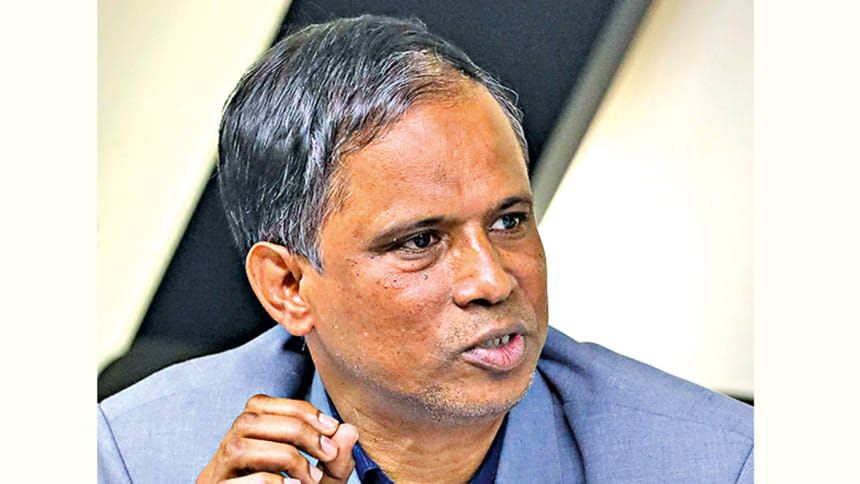
A N M Fazlul Hadi Sabbir, Executive Director, Beneficiary's Friendship Forum (BFF), Faridpur
Persistent male chauvinism continues to act as a significant barrier to women's empowerment. To address this, it is crucial to implement existing laws effectively. In this regard, I propose the following recommendations:
• Simplify Land Registration: The registration process should be streamlined, and registration fees for women should be reduced.
• Ensure Grassroots Participation: With the interim government establishing the Women's Reform Commission, active involvement from grassroots communities must be guaranteed.
•Engage Dissenting Voices: Despite opposition from some men regarding women's land rights, it is important to engage with their perspectives to better understand and address the challenges women face.
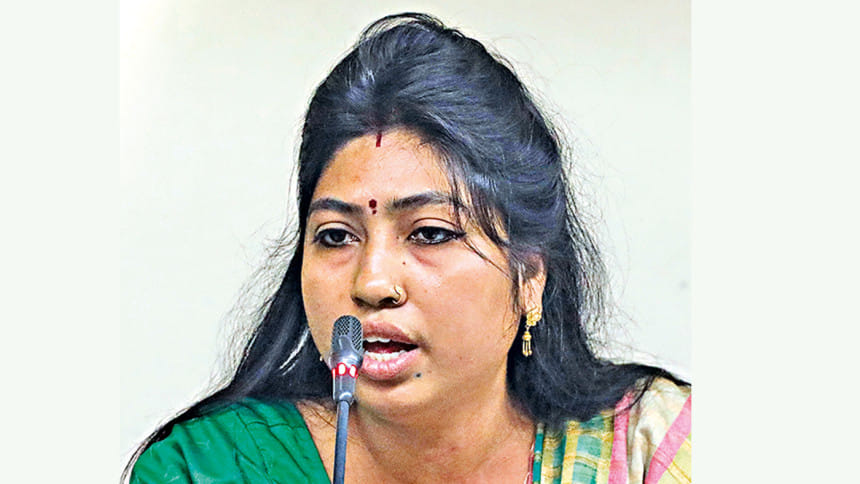
Shantona Rani Roy, Village Facilitator, Community Development Association (CDA), Dinajpur
It is deeply concerning that Adivasi women are often excluded from the Pusti Bagan (nutrition garden) project by government officials, based on the false assumption that they lack the necessary skills to handle seeds and vegetables. To rectify this injustice, these women must be granted access to Krishak Cards and be provided with training opportunities to enhance their agricultural skills.
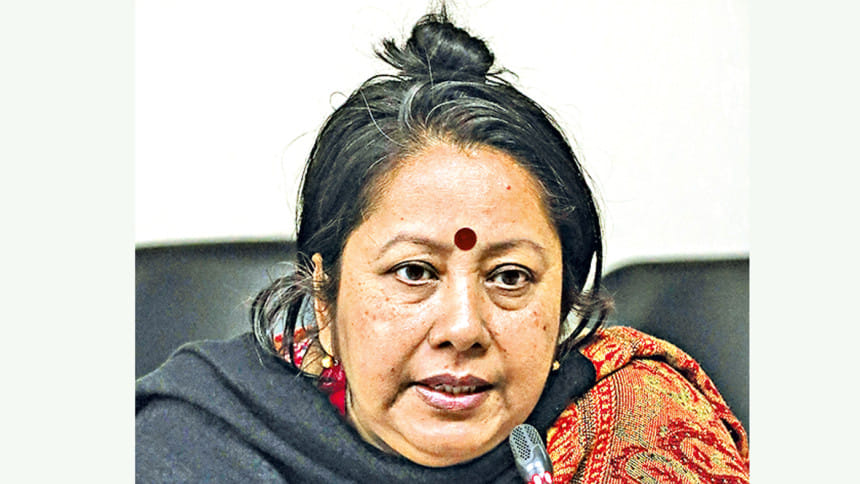
Sumaiya Islam , Member, Women's Reform Commission
I respectfully request that any reports, databases, case studies, or secondary resources relevant to the Women's Reform Commission's agenda be sent to [email protected]. We have already conducted discussions in Rangpur, Rangamati, Mymensingh, Khulna, and Chittagong. A key insight from these discussions is that collective action among women is essential to effectively combat and dismantle various forms of discrimination, particularly those stemming from male chauvinism.
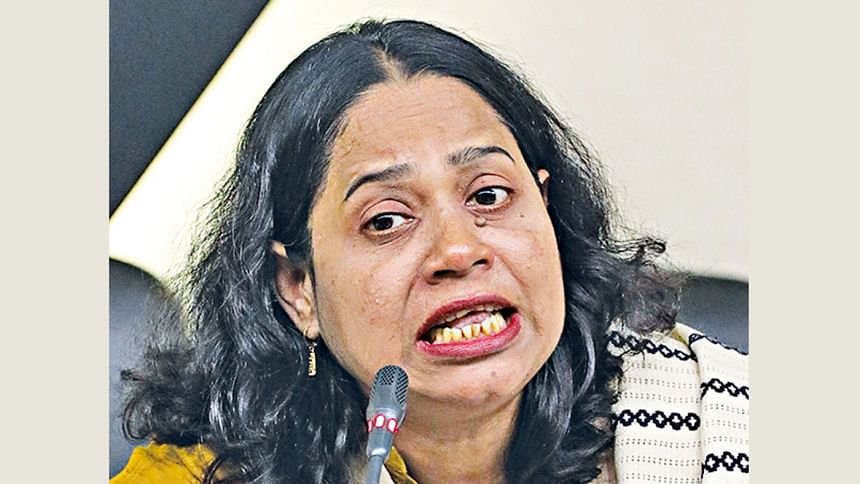
Nasrin Begum, Deputy Director, Bangladesh Nari Progati Sangha (BNPS)
Following 1971, discussions on various rights began, but CEDAW provisions—particularly Article 2, which addresses conflicts between domestic laws and women's equality, and Article 16.1(C), which covers marriage, divorce, and guardianship—have seen little to no updates due to concerns over religious backlash.
In the CHT, marriage registration remains a challenge due to conflicting customary laws and prolonged negotiations with village headmen, highlighting the urgent need for a Uniform Family Code. While British civil law is generally followed, religious laws continue to dominate inheritance and marriage matters. Past reforms, such as Ayub Khan's 1961 amendments, faced significant resistance, and any attempt to review or reform women's development policies is often met with protests from religious groups, as witnessed in 2008 near Baitul Mukarram.
Additionally, the term "abandoned wife", which carries a derogatory connotation, must be removed from all official documents. Another imposed condition—the requirement of a "able bodied male child"—also demands immediate attention.
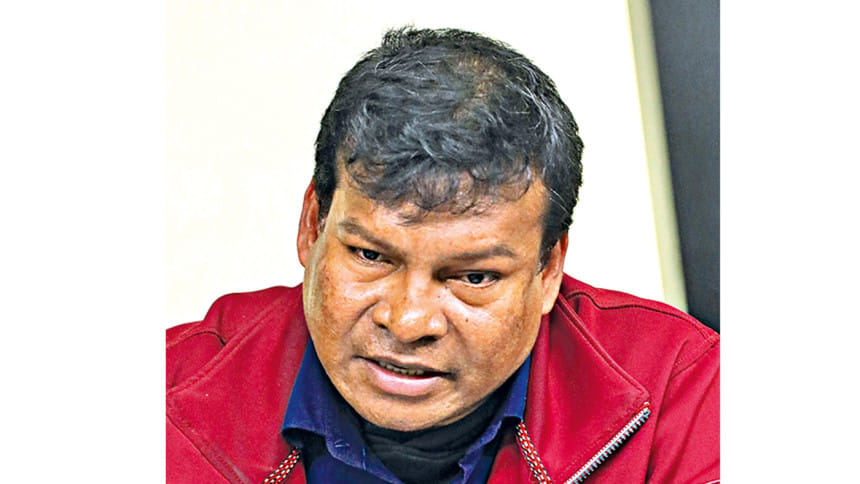
Krishnapada Munda, Executive Director, Sundarbans Adivasi Munda Sangstha (SAMS), Shyamnagar, Satkhira
I represent the Sundarbans region and want to highlight several pressing concerns. Women here play a crucial role in agriculture and other livelihood activities, yet their efforts are being undermined by the rapid expansion of shrimp farming, which is causing severe water salinisation and reducing cultivable land. This environmental shift is making traditional farming increasingly difficult, adding to the burdens on women. Additionally, the rising incidence of polygamy, possibly linked to these economic pressures, is contributing to greater vulnerability for women. Frequent cyclones and natural disasters further exacerbate these challenges, leaving the region in a state of constant instability.
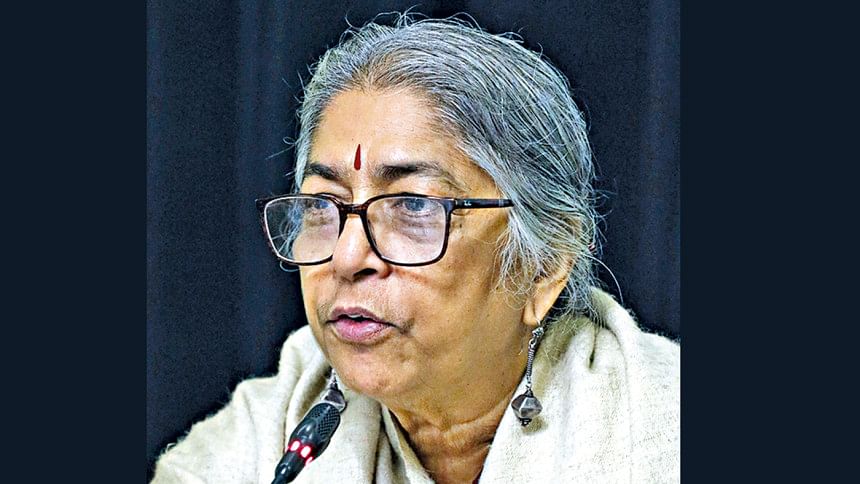
Shirin Parveen Haq, Head, Women Reform Commission and Founding Member, Naripokkho
As the head of the Women's Reform Commission, my primary objective is to address all forms of discrimination and violence against women, not only within legal frameworks but also across institutional structures. We are currently reviewing the challenges women face under existing policies. Our constitution mandates special measures for women, recognising their historical marginalisation. Similarly, Article 4 of CEDAW calls for such measures to address gender disparities.
Today's discussions have generated key recommendations, focusing on Jalmahal, khas land, and closing the gender gap. I propose three specific approaches for implementation:
• Short-term actions: Under the interim government, we must identify the most immediate steps that can be taken within the shortest possible timeframe.
• Mid-term recommendations: Addressing these issues requires sustained commitment while considering the political dynamics of the incoming government. If the new administration fails to act on our demands, we must apply pressure to ensure accountability.
• Long-term vision: The long-standing demands of the women's movement must be integrated into public discourse. Our charter should move beyond aspiration and be actively realised through sustained efforts and strategic action.
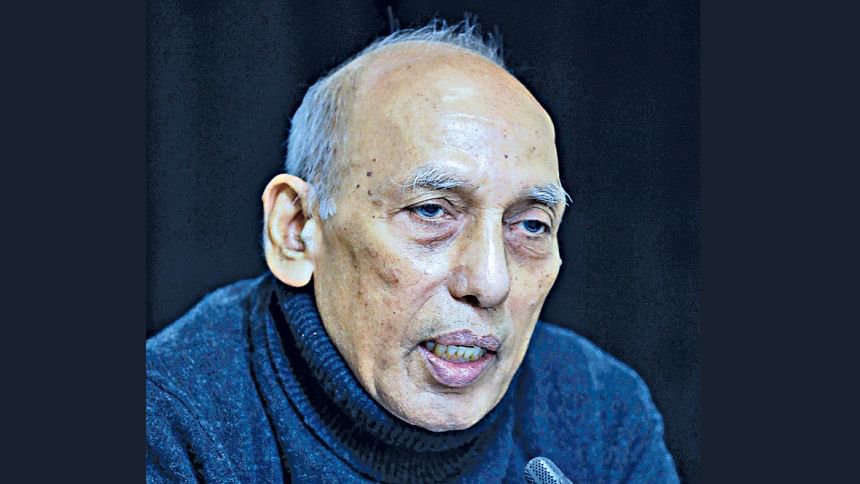
Shamsul Huda, Executive Director, ALRD
Women's rights span a broad spectrum, with land rights being a vital component. While we cannot cover every aspect today, our focus is on key issues requiring urgent attention to support agriculture, the economy, women's empowerment, and national development.
I want to highlight two critical points. First, I stress the significance of ILO Convention 141, which protects labour and agricultural female workers and enables them to form trade unions. Second, ILO Convention 169, which upholds the rights of Adivasi communities, must be incorporated into policy discussions. I strongly urge the Women's Reform Commission to integrate these issues into its broader agenda.
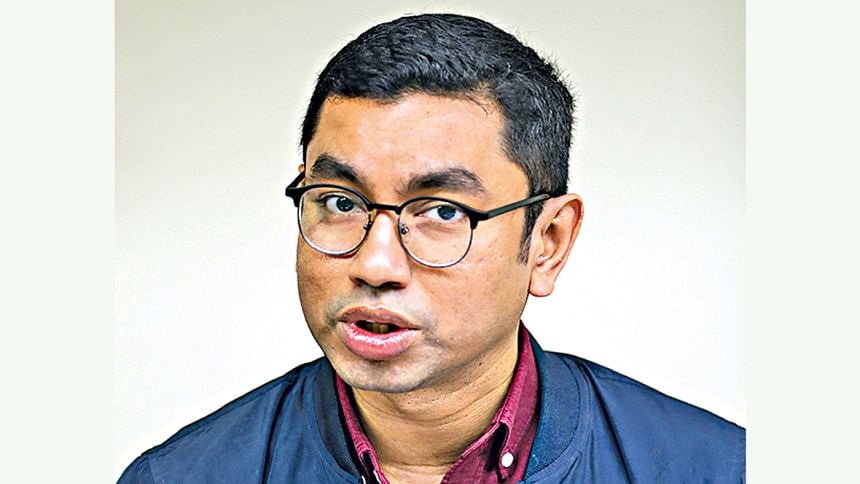
Tanjim Ferdous, In-Charge, NGOs & Foreign Missions, Business Development Team, The Daily Star & Moderator of the Session
Land is not just an economic asset; it is fundamental to women's empowerment, security, and quality of life. Despite constitutional guarantees of equal rights, women continue to face discrimination in inheritance, ownership of agricultural khas land, and land management. Addressing these challenges requires collective action.
Recommendations
- Enact legislation to guarantee equal inheritance rights for women across all religions and ethnic groups.
- Formally acknowledge women's contributions to agriculture and ensure their access to markets and marketing support for their produce.
- Ensure equal pay for male and female farmers and fishers by eliminating wage disparity.
- Reclaim khas agricultural land from influential individuals and redistribute it among the landless.
- Revise the 1997 Khas Land Management Policy to remove provisions that prioritise widowed and women abandoned by husband having abled bodied son for applying for the khas land
- Appoint women and Adivasi females as irrigation operators in the Varendra region.
- Enact a Uniform Family Code to guarantee equal inheritance rights for women, particularly addressing disparities between the plains and hill Adivasi communities. Update this code to ensure fairness and equality across all groups.
- Establish centres similar to Narikendra in Mymensingh to counter widespread anti-women sentiments in society.
- Ensure equitable access to Jalmahal (waterbodies) and forestry for female farmers by addressing their rights and participation.
- Implement ILO Convention 141 to protect female agricultural workers and ILO Convention 169 to uphold Adivasi rights, ensuring both are part of the Women's Reform Commission's agenda.

 For all latest news, follow The Daily Star's Google News channel.
For all latest news, follow The Daily Star's Google News channel. 


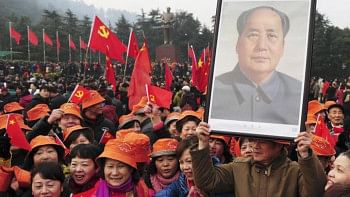
Comments